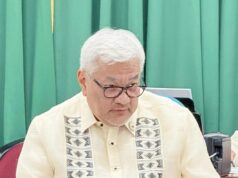CITY OF SAN FERNANDO – A member of a team of 27 foreigners who observed the May 10 polls said the Philippines is “in the right track” in adopting a partially automated polls, even as he warned against full automation.
In an interview, Jim Neddle, one of the 27 foreigners from the Compact for Peaceful and Democratic Elections- International Observers Mission (Compact-IOM), urged the government to keep a “paper trail” in its automated elections.
“I have grave concerns about a fully automated polls,” said Neddle who is actively involved in the Movement for Election Integrity in the United States. This, amid proposals from some sectors pushing for a full automation of the elections in the Philippines.
“A fully automated elections process is very vulnerable,” Neddle said, as he cited the case of the elections in Ohio state in 2004 wherein polls results in the state were transferred to a partisan server instead of being forwarded to its legal destination.
Neddle recalled that incident has been known in the US as a man-in-the-middle case and was later found to have been also set up in the states of Illinois, Colorado, and Kentucky. He said that the suspected mastermind in the case later died under mysterious circumstances.
The case showed the vulnerability of a fully automated polls known in the US as “black box voting,” he said.
Neddle said that the partial automation of the May 10 elections is much better than the black box voting.
“You have here a paper trail where you can countercheck manually the figures produced by the (precinct count optical scan) machines,” he said.
Other members of the Compact-IOM who were assigned to Pampanga also expressed support for the automated polls, but noted other problems which they plan to include in a report they will make before leaving the Philippines this week.
Paul Lempens, a member of parliament representing the Dutch Socialist Part in the Netherlands, said that the clustering of too many precincts led to long lines and long wait prompted other people to go home before they could vote.
Erna Andriyani, an officer of the Youth wing of Indonesia’s Partai Perserikatan Rakyat (People’s Union Party) noted reports that in the Nabuklod resettlement for Aeta cultural folk, some poll watchers were allowed to assist illiterate Aetas in filling up ballots.
Both Lempens and Andriyani also noted the lack of immediate replacement for busted PCOS machines as one major problem during the polls in Pampanga.
The other provinces visited by the foreign observers include Nueva Ecija, Maguindanao, Negros Oriental and Pasig City.
Arnold Tarrobago, Compact-IOM secretariat member, said that the recommendations of the foreign observers will be submitted to the United Nations, the members of the diplomatic corps, the Commission on Elections (Comelec), the Philippine Congress and different civil society groups in the Philippines and other countries.
Tarrobago said that the five areas were chosen by the Compact-IOM secretariat and convenors based on their “history of political conflict, presence of showcase electoral contests, different facets of automation, among other factors.”
The Compact-IOM local convenors include NBN-ZTE scandal whistleblower Rodoflo “Jun” Lozada, former National Statistics Office head Butch Africa, and Akbayan Rep. Etta Rosales.
In an interview, Jim Neddle, one of the 27 foreigners from the Compact for Peaceful and Democratic Elections- International Observers Mission (Compact-IOM), urged the government to keep a “paper trail” in its automated elections.
“I have grave concerns about a fully automated polls,” said Neddle who is actively involved in the Movement for Election Integrity in the United States. This, amid proposals from some sectors pushing for a full automation of the elections in the Philippines.
“A fully automated elections process is very vulnerable,” Neddle said, as he cited the case of the elections in Ohio state in 2004 wherein polls results in the state were transferred to a partisan server instead of being forwarded to its legal destination.
Neddle recalled that incident has been known in the US as a man-in-the-middle case and was later found to have been also set up in the states of Illinois, Colorado, and Kentucky. He said that the suspected mastermind in the case later died under mysterious circumstances.
The case showed the vulnerability of a fully automated polls known in the US as “black box voting,” he said.
Neddle said that the partial automation of the May 10 elections is much better than the black box voting.
“You have here a paper trail where you can countercheck manually the figures produced by the (precinct count optical scan) machines,” he said.
Other members of the Compact-IOM who were assigned to Pampanga also expressed support for the automated polls, but noted other problems which they plan to include in a report they will make before leaving the Philippines this week.
Paul Lempens, a member of parliament representing the Dutch Socialist Part in the Netherlands, said that the clustering of too many precincts led to long lines and long wait prompted other people to go home before they could vote.
Erna Andriyani, an officer of the Youth wing of Indonesia’s Partai Perserikatan Rakyat (People’s Union Party) noted reports that in the Nabuklod resettlement for Aeta cultural folk, some poll watchers were allowed to assist illiterate Aetas in filling up ballots.
Both Lempens and Andriyani also noted the lack of immediate replacement for busted PCOS machines as one major problem during the polls in Pampanga.
The other provinces visited by the foreign observers include Nueva Ecija, Maguindanao, Negros Oriental and Pasig City.
Arnold Tarrobago, Compact-IOM secretariat member, said that the recommendations of the foreign observers will be submitted to the United Nations, the members of the diplomatic corps, the Commission on Elections (Comelec), the Philippine Congress and different civil society groups in the Philippines and other countries.
Tarrobago said that the five areas were chosen by the Compact-IOM secretariat and convenors based on their “history of political conflict, presence of showcase electoral contests, different facets of automation, among other factors.”
The Compact-IOM local convenors include NBN-ZTE scandal whistleblower Rodoflo “Jun” Lozada, former National Statistics Office head Butch Africa, and Akbayan Rep. Etta Rosales.




